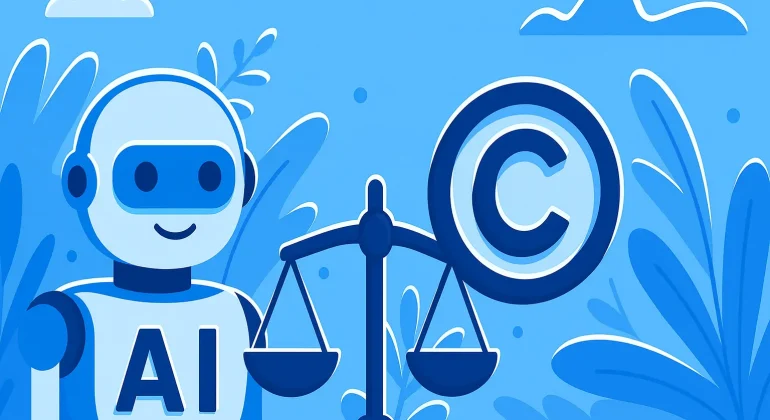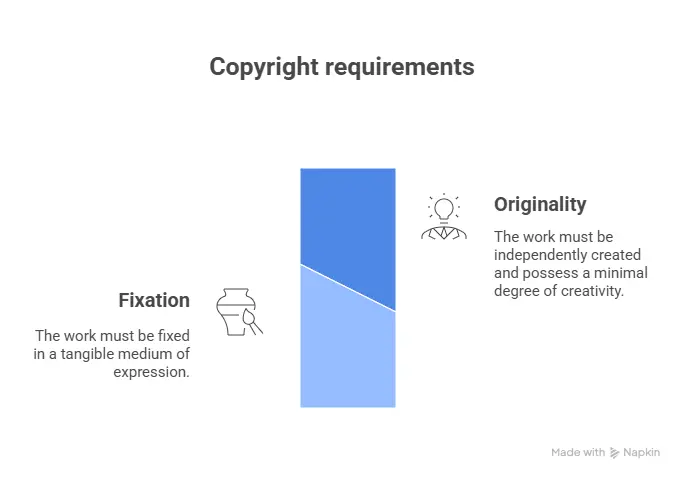Sommaire
Introduction
The rapid advancement of artificial intelligence (AI) has revolutionized various sectors, including the creative industries. AI systems are now capable of producing artworks, music, literature, and more, raising a pivotal question: Can artificial intelligence hold copyrights? This inquiry delves into the core of intellectual property law, challenging traditional notions of authorship and ownership.
Understanding Copyright Law
Definition and purpose
Copyright law is designed to protect the rights of creators over their original works, encompassing literature, art, music, and other creative expressions. It grants authors exclusive rights to reproduce, distribute, and display their creations, thereby incentivizing innovation and cultural development.
Criteria for copyright protection
For a work to qualify for copyright protection, it must meet specific criteria:
- Originality: The work must be independently created and possess a minimal degree of creativity.
- Fixation: The work must be fixed in a tangible medium of expression, making it perceptible for more than a transitory duration.
Human creativity and originality
Traditionally, copyright law has been predicated on human creativity. The concept of authorship is intrinsically linked to human intellect and personality, reflecting the creator’s unique expression.
Legal precedents emphasizing human authorship
Various legal systems have underscored the necessity of human involvement in authorship. For instance the French Intellectual property code states that only natural persons can be recognized as authors, thereby excluding non-human entities from holding copyrights.
AI-Generated works: A legal perspective
The process of AI creation
AI systems, particularly those employing machine learning algorithms, generate content by analyzing vast datasets and identifying patterns. While the output may resemble human-created works, it is produced through computational processes without human creativity.
Case studies and judicial decisions
The legal status of AI-generated works has been the subject of judicial scrutiny:
- United States: The U.S. Copyright Office has consistently denied copyright protection to works lacking human authorship. In a notable case, the Office refused registration for a work created by an AI system, emphasizing that copyright law protects “the fruits of intellectual labor” grounded in human creativity.
- China: Contrastingly, the Beijing Internet Court, on November 27, 2023, recognized copyright in an AI-generated image, attributing authorship to the individual who provided the input prompts to the AI system. The court reasoned that the person’s selection and arrangement of prompts constituted sufficient intellectual contribution to warrant copyright protection.
International approaches to AI and Copyright
The U.S. maintains a firm stance that human authorship is a prerequisite for copyright protection. The Copyright Office’s Compendium explicitly states that works produced by a machine or mere mechanical process without creative input or intervention from a human author are not registrable.
The EU has not yet established a unified position on AI-generated works. However, the emphasis remains on human creativity, with current directives implying that AI-generated content without human authorship does not qualify for copyright protection. This position was recently reaffirmed by the Municipal Court in Prague, which ruled on October 11, 2023, that an image created using the AI tool DALL-E could not be granted copyright protection under Czech law. The court reasoned that, as AI-generated content lacks human creative intervention, it does not meet the necessary requirements for copyright eligibility. This decision reinforces the notion that, within the EU, copyright remains inherently tied to human authorship.
As previously mentioned, China’s judiciary has shown a willingness to extend copyright protection to AI-generated works under certain conditions, particularly when there is demonstrable human involvement in the creation process.
Challenges and Considerations
Defining authorship in AI creations
The emergence of AI-generated content challenges the traditional definition of authorship. Determining who holds the rights to such works—be it the developer of the AI, the user who inputs prompts, or the AI itself—remains a contentious issue.
Implications for Intellectual Property Law
The current legal frameworks may require adaptation to address the complexities introduced by AI. This includes re-evaluating concepts of originality, creativity, and authorship to ensure that the law continues to incentivize innovation while protecting creators’ rights.
Conclusion
While artificial intelligence has made significant strides in creative fields, it cannot hold copyrights under existing legal frameworks. Copyright law is fundamentally designed to protect human creativity, and AI, lacking consciousness and intent, does not meet the criteria for authorship. As AI technology continues to evolve, it is imperative for legal systems to re-examine and possibly redefine concepts of authorship and creativity to address the challenges posed by AI-generated works.
The Dreyfus Law Firm partners with a global network of IP-specialized lawyers.
Follow us on social media!
Nathalie Dreyfus, with the support of the entire Dreyfus team
FAQ
1. Can artificial intelligence (AI) have copyright?
No, artificial intelligence (AI) cannot hold copyright. Under French, European, and most international copyright laws as in United States, protection is granted only to works created by a human author. Copyright requires originality, which is legally defined as the result of human intellectual effort. Since AI operates autonomously, works generated by AI alone are not eligible for copyright protection. However, if a human plays a significant role in the creative process, they may claim rights over the AI-generated content under certain conditions.
2. Why does AI pose a threat to copyright law?
AI challenges copyright law in several ways. First, AI models are trained on vast datasets containing copyrighted works, often without permission from rights holders, raising concerns about copyright infringement. Second, AI-generated content (such as text, images, and music) blurs the line between human and machine creativity, making it harder to determine what qualifies for copyright protection. Lastly, the mass production of AI-generated content can devalue copyrighted works by flooding the market with non-attributable creations. These issues call for clearer legal frameworks to balance innovation with copyright enforcement.
3. Are AI-generated images copyright-free?
No, AI-generated images are not necessarily copyright-free. If an image is created solely by an AI without significant human input, it may not qualify for copyright protection under current laws. However, the platforms generating these images often impose usage restrictions through their terms of service. Additionally, if an AI model produces an image that closely resembles or is derived from copyrighted works, it could constitute copyright infringement. It is crucial to review the licensing terms of AI-generated images and ensure compliance before using them commercially.
4. What is the relationship between AI and copyright law?
AI is reshaping copyright law and intellectual property rights. It challenges fundamental legal concepts such as authorship, originality, and infringement. AI also raises concerns about fair use and the rights of creators whose works are used to train machine learning models. Legislators, particularly in Europe with the AI Act, are working to regulate AI’s impact on copyright and establish legal clarity. Emerging solutions include granting copyright to humans involved in AI-assisted creation and developing specific licenses for AI-generated content. The ongoing legal evolution aims to balance technological advancements with the protection of creators’ rights.


